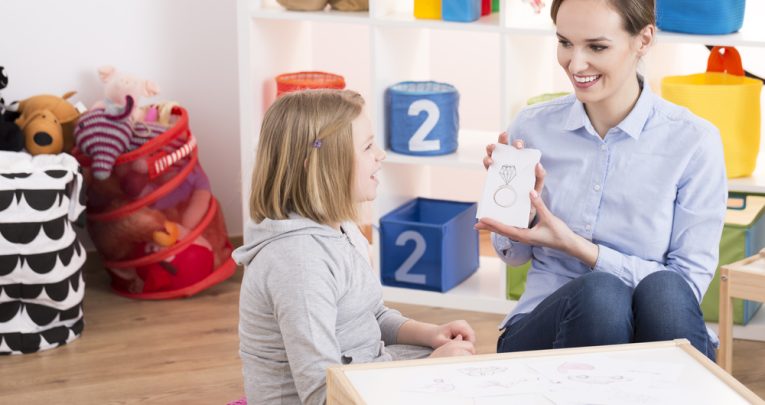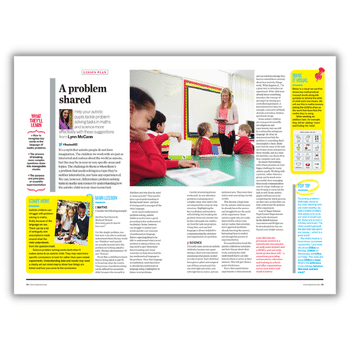10 Tips To Help Staff In Their First Year At A Special School

New to special schools? Sarah Helton has some expert advice to help you help students
- by Sarah Helton

Get your first term teaching in Special Educational Needs off to a smooth start with 10 helpful hints from The Backpocket Teacher.
1. Listen with your ears and eyes
You will have read countless documents about the children in your new class, but the best way to really get to know them is through observation. Don’t be afraid to spend time observing your students. Set up activities that your teaching assistants can facilitate and allow you to sit back, watch and listen to your pupils. You will learn how they communicate, engage with others and connect with the world. This information will be invaluable for your future planning.
2. Don’t be afraid of silences
As a teacher we often think we need to constantly be ‘doing’ to ensure people know that we are working hard. This results in too much talk and not enough pupil-lead action. Don’t be afraid of silences and pauses in your classroom. In fact, actively orchestrate silences and pauses. Too often we fail to give our children enough time to process information or to respond. Instead, we leap in with more action and chatter. Cultivate a classroom where silences and pauses are encouraged.
3. Plan for ‘champagne days’ but be happy with Prosecco!
I always told my class team that if we had a day where we achieved everything on the plan, nothing went wrong and there were no emergencies I’d take them out for champagne. It never happened! However, we had a lot of ‘Prosecco days’. They didn’t always result in us drinking wine, but we did acknowledge it had been a good day, where the students achieved a great deal and had fun doing it. Plan well and have high expectations for your students, but also except that no day will be perfect and sometimes the most wonderful learning occurs when you go slightly off plan.
4. Work closely with parents and families
Good communication, which involves listening as well as sharing information with parents and families, is essential to achieving the best for your students.
Don’t have a blanket approach to communicating with families. Instead, develop the best approach for each. This could be writing in a home-school diary, emails, phone calls, messages on a big mack switch etc. As long as the end result is good two way communication, it doesn’t matter how it is achieved.
However, remember to remain professional and be extremely cautious about using social media.
5. Never underestimate the importance of being a leader
When training to be a teacher, the skills for managing and leading a team of staff are rarely covered. Often special school class teams are large and the results achieved by your pupils will be dependent on how you manage your team. The keys things to remember for a happy and effective staff team are:
- Always display the conduct you expect of your team members
- Communicate clearly
- Share information
- Listen to their ideas
- Have written plans that work for you and your staff – they need to know exactly what to do and more importantly what you want the children to do and achieve
- Never ask your staff to do anything you wouldn’t be willing to do!
6. Working with other professionals
Another thing that isn’t generally taught to trainee teachers is how to work with other professionals. Mutual respect and collaboration are obviously paramount.
Pupils (and families) of special schools have a lot of professionals in their lives. You have to embrace the fact that many people will be coming in and out of your classroom. Your job is to manage this so that the students get the very best out of the therapists, psychologists etc.
You will need to be a talented conductor, integrating the work and advice of all professionals into the classroom and the pupils’ individualised curriculums.
7. Make sure your ‘back pocket’ is full
There will be times when you have ‘a spare 10 minutes’. When this occurs you need to have a ‘full back pocket’.
Build up a bank of activities, songs, stories etc that you can draw upon at anytime and that require minimal resources. As well as having these things in your head have items in your pockets that can be turned into a spontaneous activity. As a class teacher my back pocket was famous for containing a balloon (ready to be inflated!), stickers, a scarf, raisins, foam ball…
8. How to negotiate the staffroom
When you start in a new school it can be tempting to remain in your classroom during breaks to get your many jobs done. However, it is important to take a break from the classroom. You need refuel yourself, so don’t skip lunch to finish the laminating!
Even if you just pop into the staffroom for a few minutes each day, this allows you to gradually get to know others and is essential, because you’ll need their support and advice in the coming months.
A special school is the most caring and supportive working environment you could ever wish for. When you have a difficult day (and yes, there will be difficult days, including ones with tears), you will be overwhelmed by the care and kind words that you receive, but to receive this support people have to know you and see that you are a member of this incredible community.
9. How to survive staff meetings
To get the best out of your school you need to play an active role in all areas of school life and this includes staff meetings. However, my advice would be to initially observe a few meetings before you become too ‘vocal’. Take some time to see how the school manages staff meetings, as each school will be unique.
10. Don’t forget to look after yourself
All teaching is hard, but I believe the physical and emotional strains of working in a special school are greater than in other schools. To be a good teacher it is vital that you look after yourself. Try to take time each school day to have at least 5 minutes to yourself. For me I had to get outside and get some fresh air each day, even if it was just a walk around the car park!
And be prepared for the germs! All schools are germ magnets, but the medical needs of some of our pupils and our closer proximity to the students means that you will be very susceptible to bugs. Try hard to maintain a healthy lifestyle, with good food (and where necessary vitamin supplements), exercise and relaxation.
You are your pupils greatest resource, so look after yourself. It’s not an indulgence, it’s a necessity.
And finally, enjoy your amazing new job in a special school.
Sarah Helton is a Special Educational Needs and Disabilities (SEND) Consultant, Trainer and Author who specialises in bereavement, grief and loss. Her books include A Special Kind of Grief: The complete guide for supporting bereavement and loss in special schools (& other SEND settings) and Remembering Lucy (A children’s story book about grief and bereavement in a school) available from Jessica Kingsley Publishers.
You can find Sarah at backpocketteacher.co.uk, follow her at @backpocketteach or email her at backpocketteacher@gmail.com.











